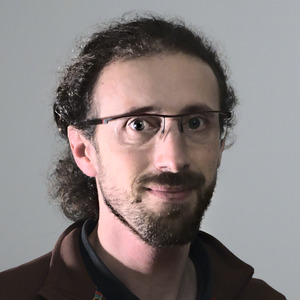About me: machine learning researcher
Machine learning researcher & enterpreneur
- Research director (DR, HDR), soda, INRIA
- Chief Science Officier of :Probabl. (a scikit-learn enterprise)
Bio
Gaël Varoquaux is a research director working on data science at Inria
(French computer science national research) where he leads the Soda team. He is also co-founder
and chief science officer of Probabl.
Varoquaux's research covers
fundamentals of artificial intelligence,
statistical learning, natural language processing, causal inference, as
well as applications to health, with a current focus on public health
and epidemiology. He also creates technology: he
co-founded scikit-learn, one of the reference machine-learning toolboxes,
and helped build various central tools for data analysis in Python.
Varoquaux has worked at UC Berkeley, McGill, and university of Florence.
He did a PhD in quantum physics supervised by
Alain Aspect and
is a graduate from Ecole Normale Superieure, Paris.
Research Interests
Machine learning research:- Tabular relational learning and NLP
- Evaluation
- Machine learning on dirty data
- Missing data in machine learning
Machine learning and public health:
- Analytics on health databases for personalized medicine and treatment development
- Causal inference
Machine learning for mental health, cognition, and brain activity:
- Biomarkers of mental traits and disorders
- Resting-state and functional connectivity
- Encoding and decoding models of cognition
Open-source software
Core contributor to scientific computing in Python:
- scikit-learn: Machine learning in Python
- joblib: lightweight pipelining of scientific code
- Mayavi: 3D plotting and scientific visualization
- nilearn: Machine learning for NeuroImaging
- skrub: Prepping tables for machine learning
Contact
Impact
Awards
- Doctorats honoris causa, UC Louvain 2025.
- Highly-cited researcher, Clarivate, 2021, 2022, 2023, 2024.
- Prix de l'Académie des Sciences du transfer 2019, The French National Academie of Science.
- François Erbsmann Prize Honnorable mention, 2013 The most prestigious award in medical imaging.
- Nominated member of the Python Software Foundation
- FOSS India award 2008 shared with Prabhu Ramachandran, for Mayavi
Bibliometry
Open source
World-wide recognized contributor and project-manager for open-source scientific software.

Professional service
- Expert at the National committee on AI
- Expert at the Global Partnership on AI (OECD), 2020-2021
Editorial duties
- Program committee: NeurIPS (area chair), ICML (meta reviewer), ICLR (area chair), AISTATS, AAAI, Senior Program Committee IJCAI.
- Editor: Elife (2018- 2021) — Editor NeuroImage (2014-2017); Editor Frontiers in NeuroInformatics (2013-2016); Guest editor: Machine learning journal, Journal of Computational Science
- Workshops
- Table Representation Learning, NeurIPS 2023 workshop
- Automating Data Science in the face of messy data, ECML 2021 workshop
- The art of learning with missing values, ICML 2020 workshop
- Past(selected list)
- Chair of the steering committee: PRNI (Pattern Recognition in NeuroImaging), 2014
- General chair: EuroScipy 2010 and 2011 (Paris)
- Program chair: IEEE PRNI (Pattern Recognition in NeuroImaging) 2013 (Philadelpia), Scipy 2008 and 2009 (Pasadena)
Teaching
- Machine learning with scikit-learn MOOC Materials
- Past
- Machine learning for digital humanities at EHESS
- Machine learning with scikit-learn at ENSAE (materials)
- Statistics with Python at the CogMaster masters in cognitive science, ENS Paris (materials)
- Functional brain connectivity at the Bio-Medical Engineering master, Telecom ParisTech
Major keynote talks
See my speakerdeck Older talks on slideshareEducation and previous positions
- McGill MNI 2019-2020: Visiting professor
- Mila Mila 2019-2020: Visiting professor
- INSERM unicog 2010-2011: Post-doc on pronostics with resting-state fMRI
- INRIA parietal 2008-2010: Post-doc on resting-state fMRI methods
- UC Berkeley 2008: software engineer on nipy
- Consultant in scientific computing 2008: Enthought
- Marie Curie European Fellow 2007-2008, with Massimo Inguscio at LENS, Florence
- PhD in Quantum Physics 2005-2007: Université Paris-Sud Orsay, supervision Alain Aspect, topic: Atomic sources for long-time-of-flight interferometric inertial sensors
- Masters in Quantum Physics 2004: Ecole Normal Supérieure
- Ecole Normal Supérieure 2001-2004: undergraduate studies

